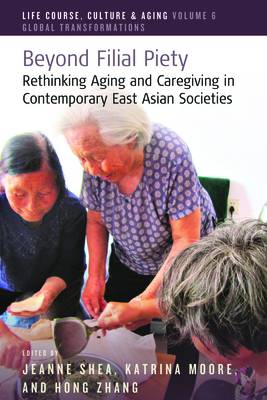
- Afhalen na 1 uur in een winkel met voorraad
- Gratis thuislevering in België vanaf € 30
- Ruim aanbod met 7 miljoen producten
- Afhalen na 1 uur in een winkel met voorraad
- Gratis thuislevering in België vanaf € 30
- Ruim aanbod met 7 miljoen producten
Beyond Filial Piety
Rethinking Aging and Caregiving in Contemporary East Asian Societies
Omschrijving
Known for a tradition of Confucian filial piety, East Asian societies have some of the oldest and most rapidly aging populations on earth. Today these societies are experiencing unprecedented social challenges to the filial tradition of adult children caring for aging parents at home. Marshalling mixed methods data, this volume explores the complexities of aging and caregiving in contemporary East Asia. Questioning romantic visions of a senior's paradise, chapters examine emerging cultural meanings of and social responses to population aging, including caregiving both for and by the elderly. Themes include traditional ideals versus contemporary realities, the role of the state, patterns of familial and non-familial care, social stratification, and intersections of caregiving and death. Drawing on ethnographic, demographic, policy, archival, and media data, the authors trace both common patterns and diverging trends across China, Hong Kong, Taiwan, Singapore, Japan, and Korea.
Specificaties
Betrokkenen
- Uitgeverij:
Inhoud
- Aantal bladzijden:
- 432
- Taal:
- Engels
- Reeks:
- Reeksnummer:
- nr. 6
Eigenschappen
- Productcode (EAN):
- 9781800734470
- Verschijningsdatum:
- 8/04/2022
- Uitvoering:
- Paperback
- Formaat:
- Trade paperback (VS)
- Afmetingen:
- 229 mm x 152 mm
- Gewicht:
- 589 g

Alleen bij Standaard Boekhandel
Beoordelingen
We publiceren alleen reviews die voldoen aan de voorwaarden voor reviews. Bekijk onze voorwaarden voor reviews.










